Pregnant women on Medicaid in Florida wait weeks or months before seeing an obstetrician
DAYTONA BEACH — By the time Angela Bennardo finally reached the end of a Medicaid maze that led to the inside of an obstetrician's office for the first time in February, she was seven months pregnant.
Takella Bron is four months pregnant, and she just found out her request to get her prenatal care covered by Medicaid was denied. She can appeal and apply again, but it could take weeks to get an answer and months to finally be seen by an OB-GYN doctor.
A few weeks ago, a girl with a high-risk pregnancy showed up at the Pregnancy Crisis Center in Daytona Beach searching for help. She's already three months pregnant, but the Medicaid system won't let her switch to the plan she needs until November.
The three are among roughly 3,000 women in Volusia and Flagler counties who use Medicaid every year for prenatal care and deliveries. More than half of women who give birth in Volusia County and all across Florida use Medicaid during their pregnancies.
More than half of the women in Volusia County who use Medicaid can't find prenatal care.
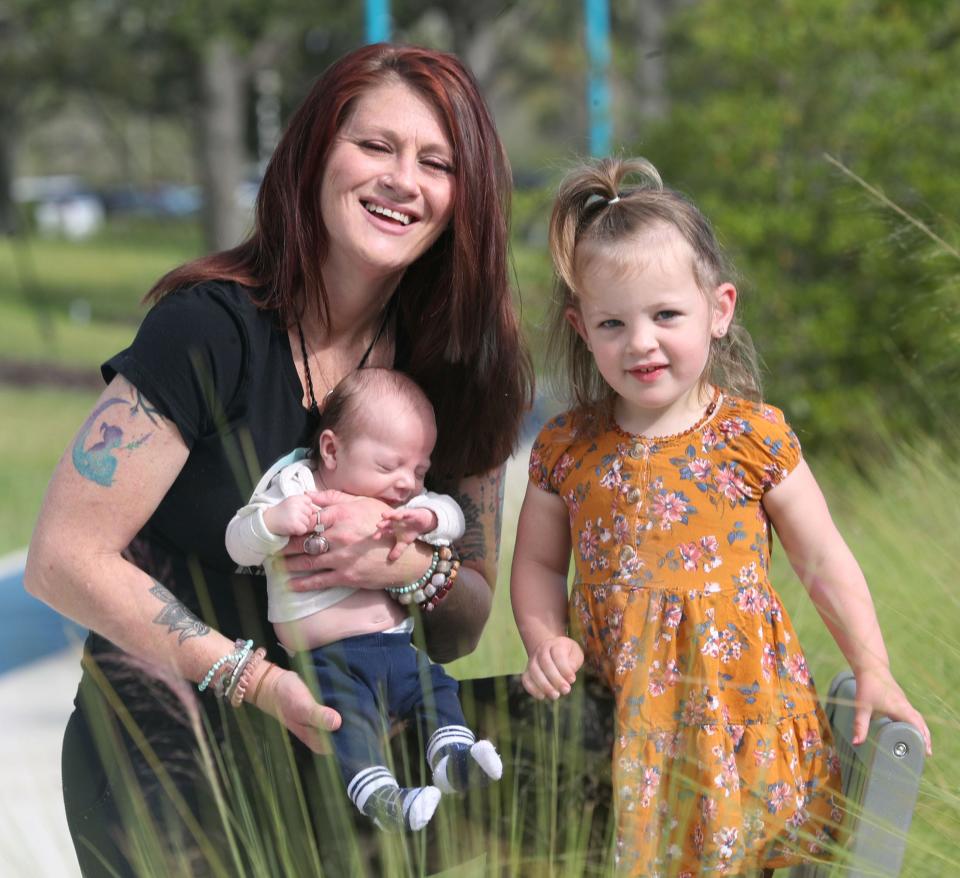
For many of the financially strapped mothers-to-be who manage to sign up for Medicaid's pregnancy coverage, the federal and state government-funded assistance provides desperately needed help. About 63% of births in Florida are billed to Medicaid, according to the Agency for Health Care Administration.
State government officials have expanded Medicaid programs for mothers and children in recent years, but a growing number of Florida women who attempt to bring their children into the world with the help of Medicaid are still finding the system maddening.
Poverty in Volusia County: 'A community of amazing people:' Ormond woman on brink of homelessness saved. Here's how
Idea to help Daytona homeless: Daytona homeless shelter reveals details on plan to add on-site affordable housing
Affordable housing help coming: Florida's new affordable housing law strips power from local government officials
Some have nothing but smartphones for their journey into the arduous online application process. But even those with computers say the applications, once they can find them, are confusing and difficult to complete.
If anything written on the application is incorrect, or if a question isn't answered, the application is not processed. Calling for help is equally frustrating, and it's difficult to reach a person on the other end, especially a person who can help, they say.
Those who are able to successfully enroll in Medicaid say it can be a battle to find a doctor who will accept the insurance plan the system assigns them. If too much time passes, many obstetricians will deem them high-risk and refuse to take them on as patients.
Following the Medicaid money
Florida has been pouring about $34.5 billion to $37.5 billion annually into Medicaid coverage over the past few years – about a third of the state's budget.
Some question how that's being divvied up, and argue that doctors demand too large a share, or that less should land in the coffers of insurance companies.
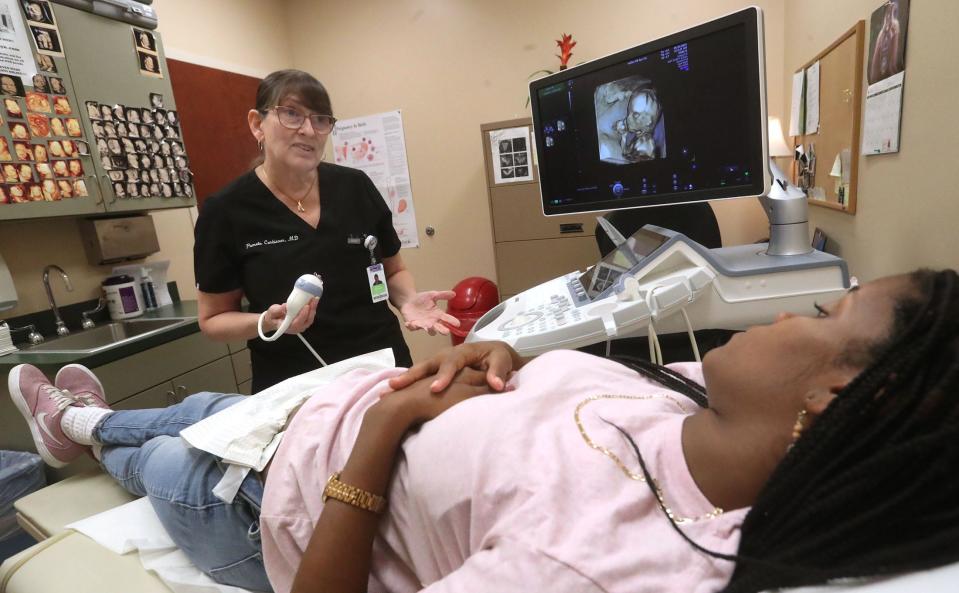
Dr. Pamela Carbiener, a longtime Daytona Beach obstetrician and gynecologist, said doctors typically get less than 10 cents of every healthcare dollar spent.
While billions of dollars flow out of Tallahassee, a growing number of women both locally and statewide are deep into their pregnancies when they see an obstetrician for the first time. From 2012 to 2020, the percentage of women in Florida getting first-trimester care declined from 80% to 76%.
More are skipping prenatal care altogether, and when they come to the hospital to deliver many arrive with no insurance, risk factors such as dangerously high blood pressure, and pregnancy complications that would have been avoided with regular medical care.
"You're throwing all these risk factors at a woman," said Dixie Morgese, who for 15 years was executive director of Healthy Start Coalition of Flagler & Volusia Counties. "There's no do-overs in pregnancy."
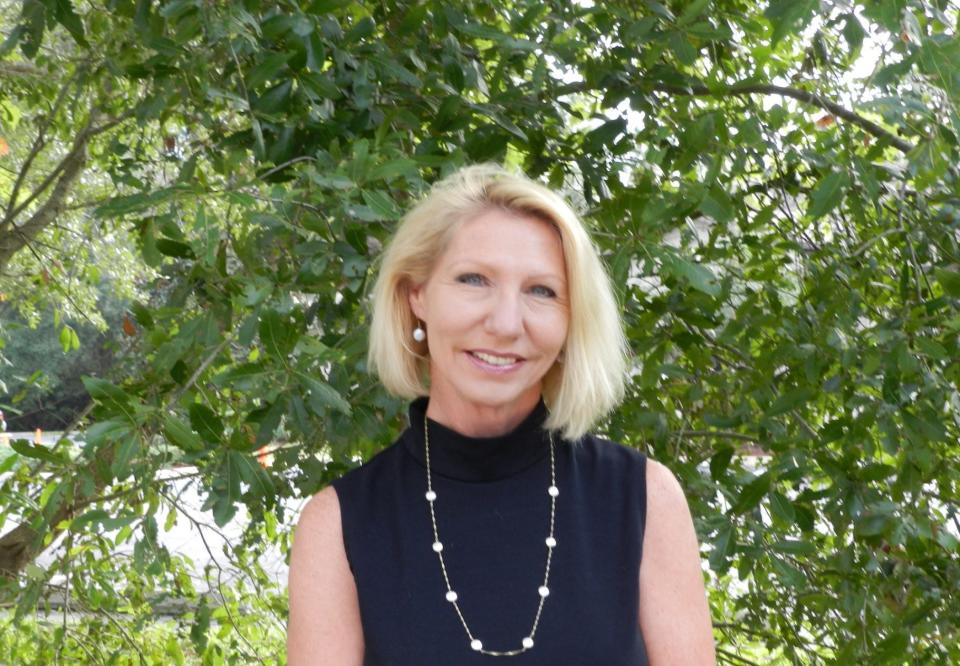
Volusia County a prenatal care desert for Medicaid moms
Volusia County, and other areas of Florida, have become prenatal care deserts for women on Medicaid. More than 20 Florida counties have low access to prenatal care clinics or providers, or are considered maternity deserts, according to the March of Dimes.
The number of women in Volusia County who haven't received prenatal care until their third trimester, or never had prenatal care, has been climbing since 2002. Statewide figures show an even more pronounced trend toward late care or complete lack of prenatal care.
About 20% to 25% of women in Volusia County, and across Florida as a whole, are not getting first-trimester prenatal care.
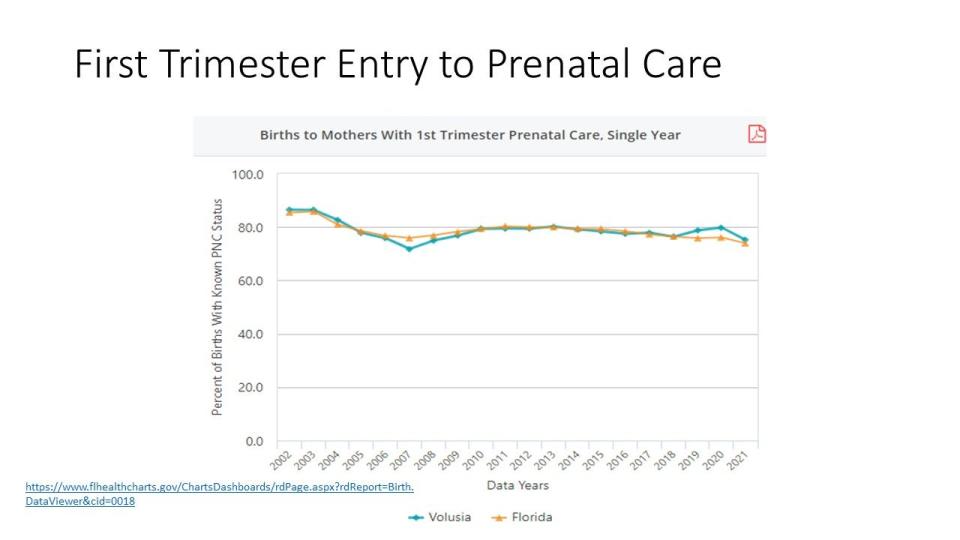
Lack of maternity care access is a problem nationwide. Areas where there is low access or no access affect up to 6.9 million women and almost 500,000 births across the United States, and those numbers have been rising since 2020, according to a 2022 March of Dimes study.
The U.S. has the worst maternal death rate of any developed country, and it's been getting worse. Severe maternal complications more than doubled in the past 20 years.
"This is a Dumpster fire on which we are spraying gasoline, as the few remaining local physicians stop seeing Medicaid-covered moms," Carbiener said.
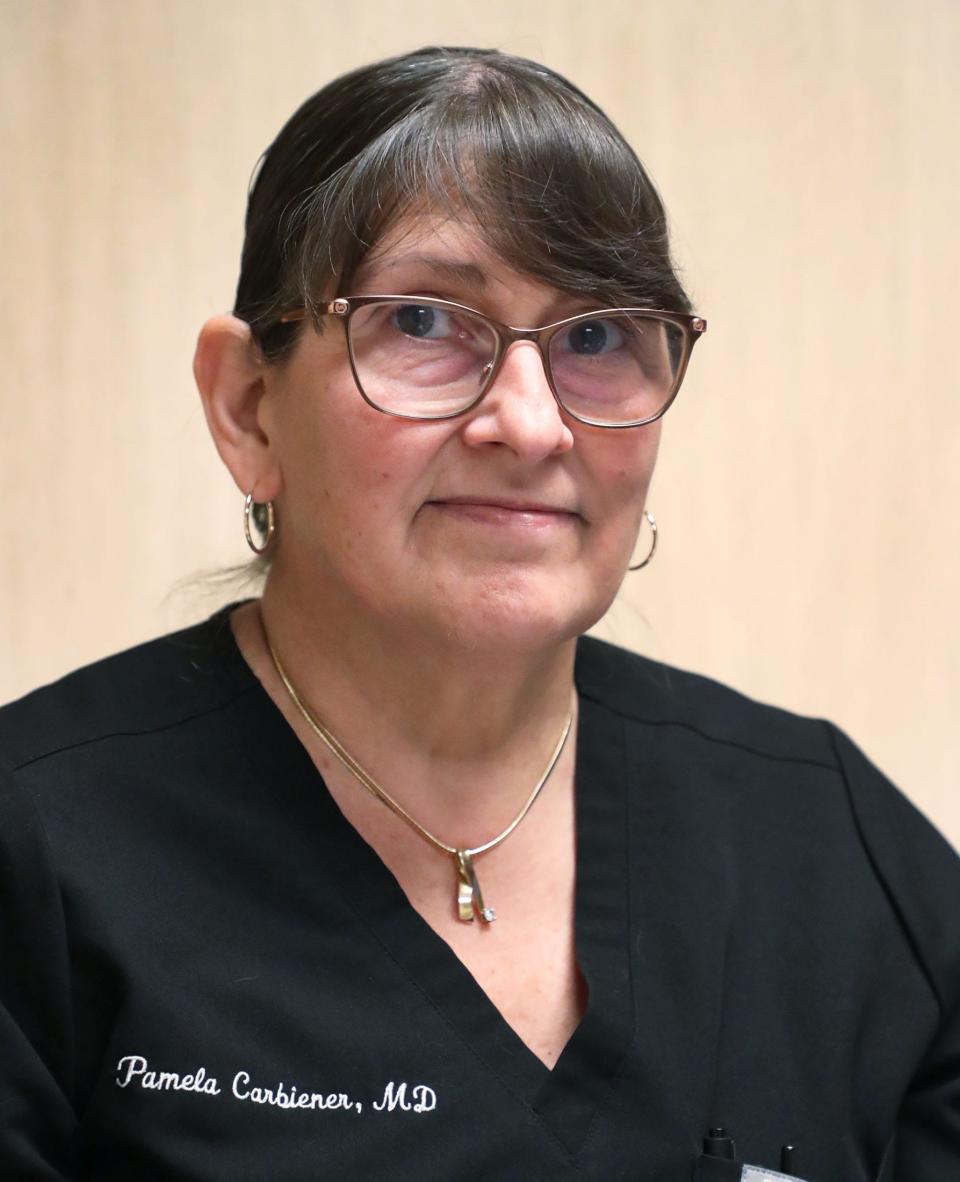
A handful of Volusia County doctors are trying to keep OB-GYN services available for local women on Medicaid.
A DeLand-based obstetrician, Hussain Rawji, still takes Medicaid patients. Sachoya McDonald, a third-year resident who's been working in a Daytona Beach OB-GYN office for three years, plans to start a family medicine practice that will include specialized women's health services and accept Medicaid patients.
Carbiener, one of the few obstetricians in Volusia County who accepts patients with addictions, and the other doctors at Halifax OB/GYN Associates in Daytona Beach have been helping women on Medicaid for more than a decade.
But for the past few months, Carbiener and her partners mostly stopped taking new Medicaid patients because dealing with the program's insurance companies was leaving them with too many headaches and not enough reimbursement dollars.
Carbiener was still going to see her established Medicaid patients through their pregnancies, but until the end of last month, it looked like they were going to be her office's last Medicaid patients.
She was ready to cut ties with the Medicaid insurance companies her practice had accepted. Then on the morning of May 23, she sent two emails to her patients to let them know she had worked out an agreement with United Healthcare and could again accept their insurance plans effective immediately, including Medicaid coverage.
The Medicaid pregnancy insurance quandary
Volusia County's pregnant women who can't match their Medicaid insurer with a doctor have few options for prenatal care.
"There can be lots of OB-GYNs and hospitals, but if my insurance isn't accepted, it's a maternity care desert," said Morgese, who retired in 2020 from the Healthy Start Coalition, a group that tries to make moms and babies healthier.
Carbiener, the head of the Volusia County Health Department and others are working on a plan to open a clinic in Daytona Beach next year to help catch at least some of the Medicaid patients from falling through the cracks during their pregnancies.
Shar Quan Baker couldn't find prenatal care anywhere in Volusia County, so Carbiener agreed to take her on as a patient late last month. Baker has Molina Medicaid, which doesn't contract with Halifax OB/GYN, so Carbiener knows her office probably won't be reimbursed for its expenses.
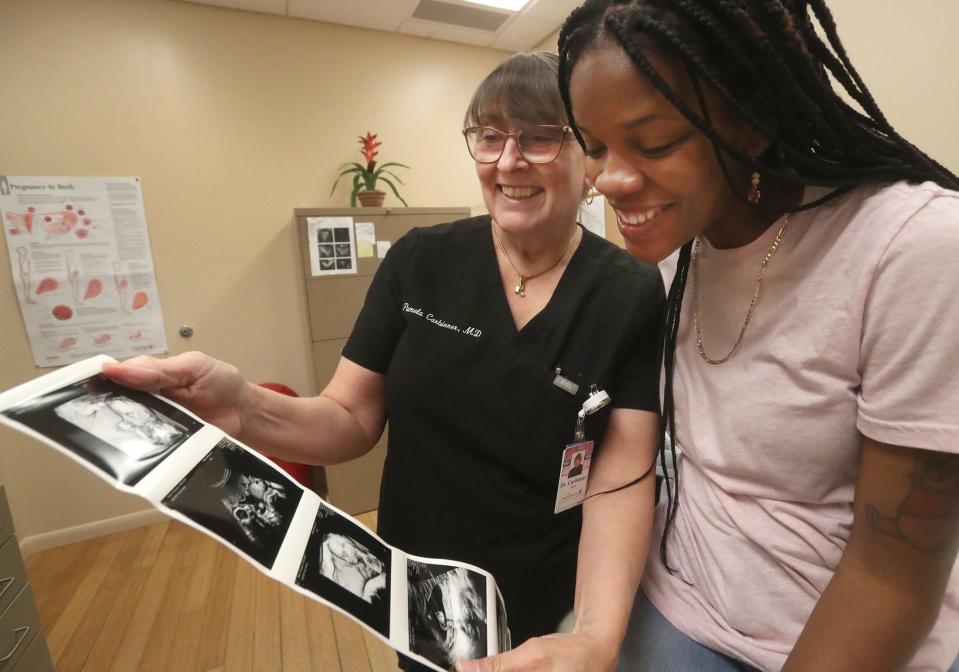
Florida's state government authorizes five insurance companies to handle pregnancy Medicaid in Volusia County: Humana, United Healthcare, Magellan, Staywell Health and Sunshine Health.
Women who have problems getting their insurance accepted, or don't have insurance, sometimes show up at Volusia County hospital emergency rooms. Hospitals are not designed for prenatal care, and Morgese is worried that the health of pregnant women and their babies will continue to slide in Florida.
Potential dangers for moms and babies
Most women should be seen by an obstetrician within six to eight weeks of becoming pregnant "to confirm viability," Carbiener said.
"One of every three conceptions does not get past the first eight weeks," she said.
Those who have healthy pregnancies should then be seen every four weeks until they reach the 30-week mark, every two weeks until 36 weeks, and then weekly until delivery.
"The whole point of prenatal care is to identify if a patient brings a high-risk condition to a pregnancy like diabetes or drug use, or develops a high-risk condition like gestational hypertension or growth restriction so that we can minimize the impact of the condition and get the healthiest mom and baby possible," Carbiener said.
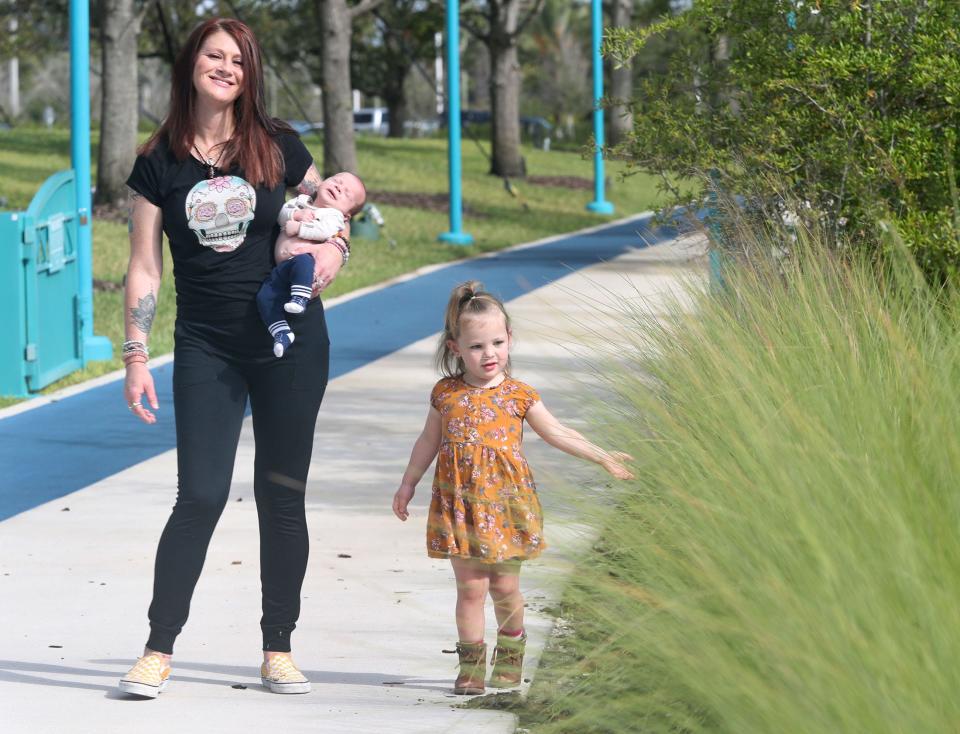
Women are less likely to find an obstetrician willing to take them after their pregnancy has gone past four or five months. Doctors trying to steer clear of lawsuits will often turn away patients after 18-20 weeks of pregnancy, something Carbiener calls a "deplorable habit."
A report from the Florida Maternal Mental Health Collaborative said maternal stress has been linked directly to infant illnesses, low birth weight and prematurity.
The report recommends the state's Agency for Health Care Administration and the Florida Department of Children and Families, which oversee Medicaid in Florida, examine systemic issues with managed care plan transitions and delays in changing Medicaid types and plans.
The report also suggests increasing the number of DCF access sites and support staff to assist people applying for pregnancy Medicaid and expanding prenatal healthcare access.
Medicaid privatization
Around 2010, Florida petitioned the federal government to join other states in privatizing Medicaid insurance. The argument was that private insurance companies would provide better, cheaper, and more efficient care.
Privatization was approved and implemented in 2014.
Florida's larger health departments realized their reimbursements from the state were going to drop and their prenatal care clinics would operate at a loss. Most county health departments set up different care options and closed the prenatal clinics.
Volusia County Health Department prenatal clinics shuttered in 2012, so both Halifax Health and AdventHealth opened clinics to provide prenatal care to the Medicaid patients previously seen at the Health Department. Halifax Health has also hired two female family practitioners who have had advanced training in women's health, and the goal is for them to provide some prenatal care.
But things are handled differently at the two Volusia hospital system clinics. The wait is currently eight weeks minimum just to get on a list for an appointment.
"I am being contacted by Catholic Charities and other groups in the area about how they cannot find doctors for their pregnant moms," Carbiener said.
The hospital clinics also don't provide services for enrollment in Medicaid, Healthy Start, WIC, and food stamps. And the clinics turn away patients who they consider too high-risk and those who seek care late in their pregnancy.
A more complicated system to figure out
When the private insurance companies took over Medicaid in Florida, DCF stopped providing much of its onsite, in-person support to women applying for pregnancy Medicaid. Many women have been left to figure out on their own what to do online.
Enrollment that took 72 hours in the 1990s now usually takes at least two months. The result is women are already a few months pregnant when they begin a search for a doctor who will accept their new insurance.
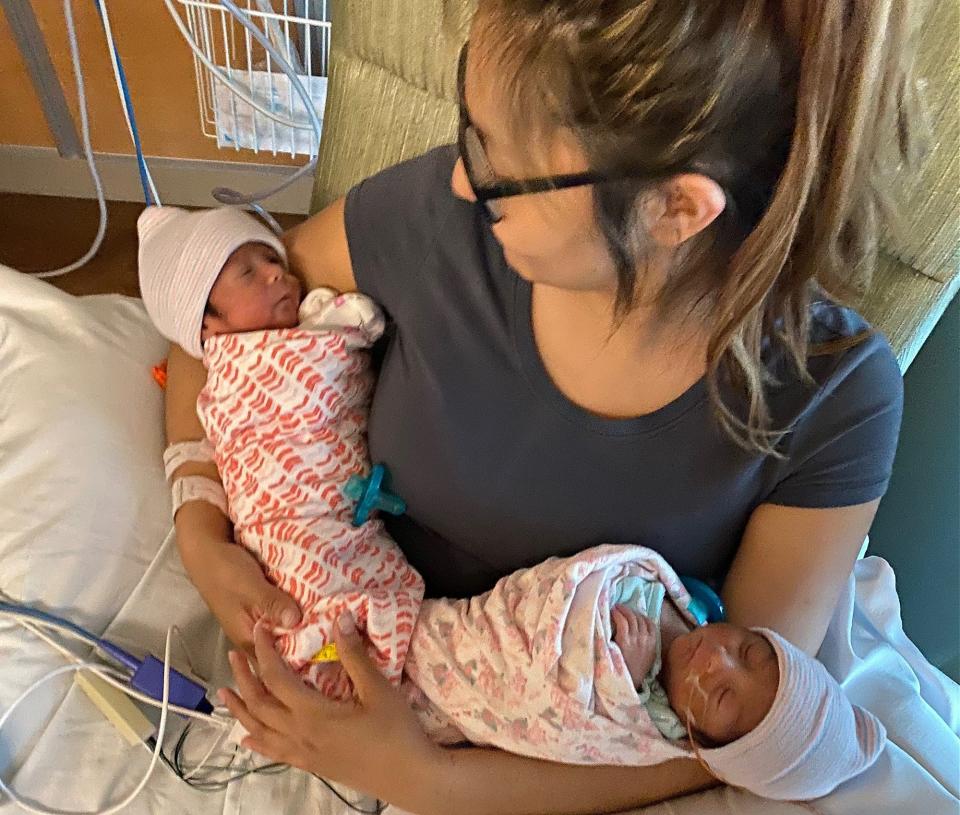
Some women who need Medicaid just give up and don't even try to get into the system.
"Women are too busy trying to find a couch for themselves and their kids to even try to get online and get Medicaid, and then try to find a provider who will accept it," Carbiener said. "Hierarchy of needs forces them to put it on the back burner."
Physicians who have accepted pregnant Medicaid patients sometimes find reimbursement from private Medicaid insurance companies inadequate, and the burden of prior authorizations for routine care, retroactive denials of payment, and administrative duties are too great.
Three of Carbiener's six physician partners abruptly left at the beginning of this year in part because of Medicaid challenges.
"We intend to hire new physicians and mid-levels, but we are struggling to find obstetricians and midwives that want to practice in Florida," she said.
Bailey Smith, communications director for the Agency for Health Care Administration, said pregnant women can still apply for Medicaid at a DCF customer service center or with a DCF community partner. She provided this link for more information: https://www.myflfamilies.com/services/public-assistance/applying-for-assistance.
Smith mainly responded with website referrals to a few questions about the struggle pregnant women in Florida are having with the Medicaid system and noted they can use a secure portal 24 hours a day.
She said anyone with a problem can submit a complaint to AHCA using the Florida Medical Complaint Form found at https://www.flmedicaidmanagedcare.com/complaint.
When told about the difficulties women are having trying to sign up for Medicaid and accessing care, she said DCF should respond to enrollment questions.
"AHCA administers the Medicaid program. DCF determines Medicaid eligibility," Smith said.
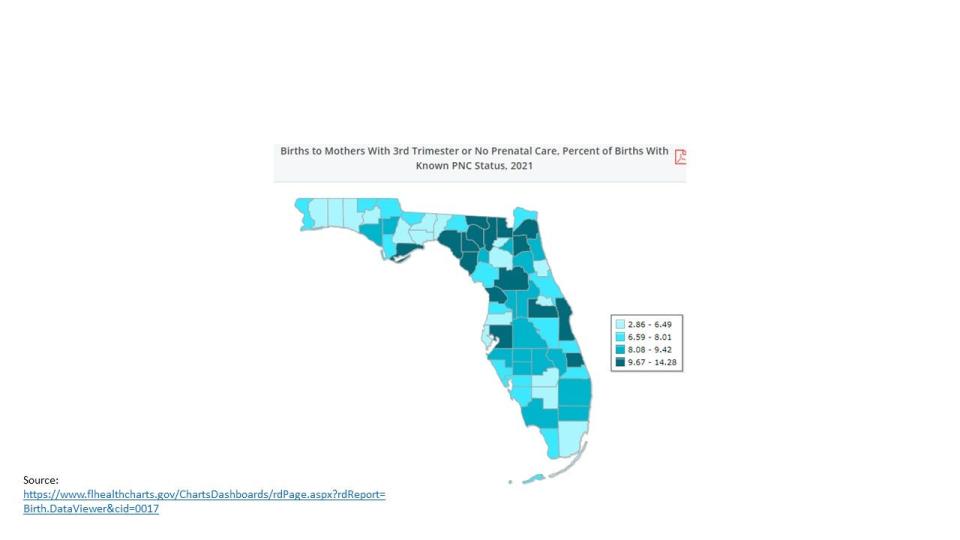
Morgese and others say part of what might be making things more difficult for patients and doctors is that Florida has gone from one state agency overseeing different aspects of Medicaid – the Department of Health and Rehabilitative Services – to three: AHCA, DCF and the Florida Department of Health.
When asked what challenges AHCA is facing, and what might be making it difficult for the state to handle pregnancy Medicaid, this was Smith's response: "Medicaid pays for more than 50% of all births in Florida, providing important medical coverage for millions of Floridians across a diverse population and large demographic area."
When asked why Medicaid was privatized in Florida, she said: "These programs are designed to increase the quality of care and client outcomes."
Medicaid an ongoing financial balancing act
Jeff Feasel, president and CEO of Halifax Health, said his hospital system's Medicaid clinic in Daytona Beach provides access for prenatal care and deliveries. He said one of Halifax's residents who's going to graduate this month will also provide OB-GYN care to Medicaid members in Port Orange.
"Hopefully she'll help fill the gap," Feasel said.
Halifax Health is also considering opening a prenatal care clinic in Deltona, he said.
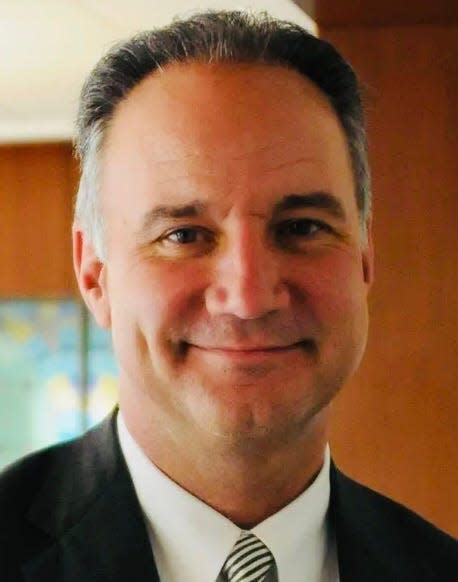
He said his hospital, which handles 60% of all births in Volusia County, also struggles with Medicaid.
"Medicaid will reimburse you at 60%-70% of costs, so you lose money. But it's part of our obligation," he said.
The private insurance companies that take on Medicaid patients receive a payment every year for each person they enroll regardless of how much healthcare, if any, that person accesses, Feasel said. So when a pregnant woman is delayed getting care, the insurance company could be making more money off of her.
Feasel's not sure how much the insurance companies that accept Medicaid patients get from the state government, but he estimates it's in the range of $1,000 to $4,000 per patient per year. AHCA sets the per-patient allotment, which is known as the capitated rate.
The problem, he said, is "the reimbursement is inadequate for doctors."
"Managed care says we can't afford to pay them more," Feasel said.
If a patient's healthcare bills exceed what's set aside for them, the insurance company has to swallow the loss.
The frustrated Medicaid moms
Angela Bennardo and Tekella Bron have been in the trenches of Medicaid in Volusia County. Bron used Medicaid for her first three pregnancies, but now as she marks her 17th week of pregnancy number four, she's having trouble getting approved for insurance.
The 30-year-old Daytona Beach woman is anxious to get to an obstetrician to make sure everything is OK with her pregnancy. She's trying to get to a doctor before her third trimester, which will begin at 27 weeks, but she's confused about what she should do now.
"This never happened before," Bron said. "I'm nervous. I'm praying."
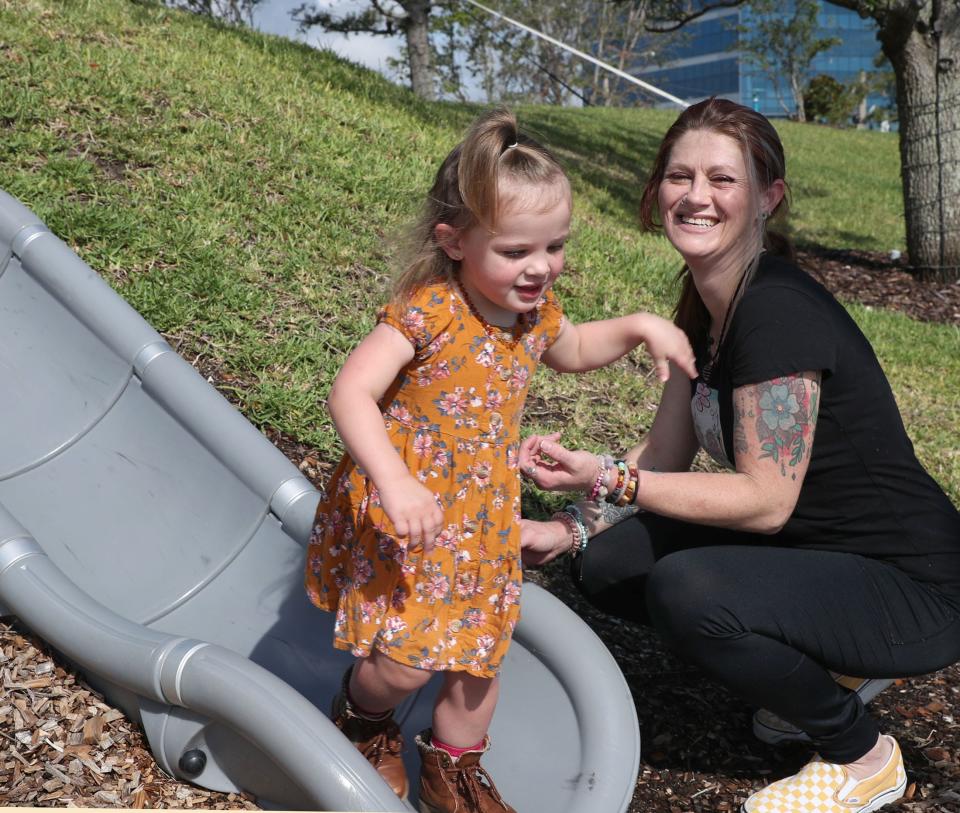
Bennardo just gave birth to her second child on April 7, and she said the Medicaid part of her pregnancy was "a nightmare."
"I didn't have anyone to help me or answer my questions (about Medicaid). It's all up to you," she said.
The 35-year-old Daytona Beach woman also struggled with Medicaid during her first pregnancy in 2019, when she had just gotten through rehab for opioid addiction. That year she was randomly assigned to Humana insurance within the Medicaid system, but she needed United Healthcare to see the Daytona doctor who specializes in helping pregnant women who have struggled with addictions.
"You keep getting automated systems when you call. You can't get a human being to explain it," Bennardo said. "We need a navigator."
She wound up having to wait for an open enrollment period to switch to United Healthcare.
Should Florida expand Medicaid?
Some argue that Florida's Medicaid program could improve if it grew. Florida is one of just 10 states that have not signed onto Medicaid expansion, a provision of the 2010 Obamacare law that became optional because of a 2012 Supreme Court ruling.
The federal government offered Florida $6.6 billion last year to expand Medicaid, but Gov. Ron DeSantis and Florida's state legislators said no thanks.
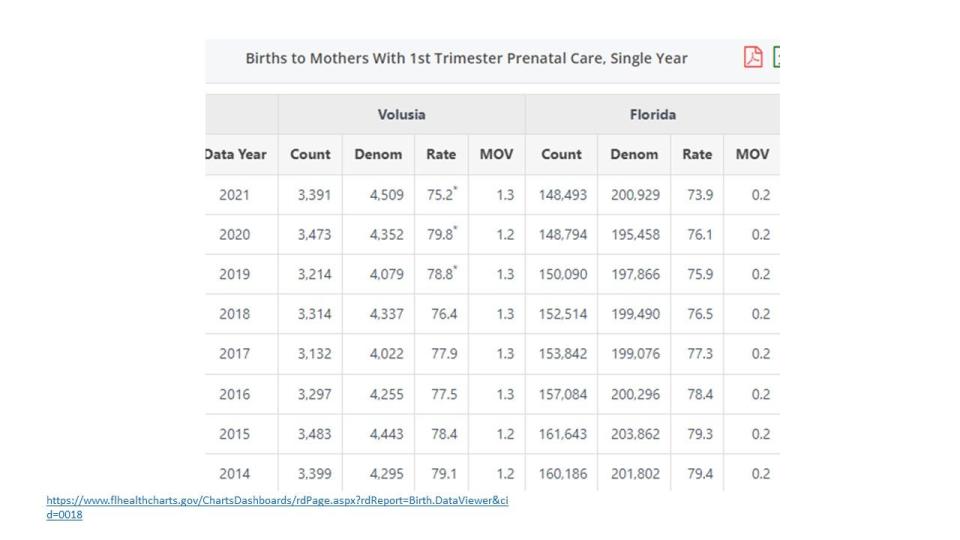
Florida is actually paring its Medicaid rolls. Roughly 250,000 Floridians have lost their Medicaid coverage since the beginning of April when the state began reviewing the eligibility of more than 5 million people, something happening in states across the country with the end of the continuous coverage provision put in place when the COVID pandemic began.
There hasn't been a big group lobbying for poor pregnant women, so those who do advocate for them are "asking that the legislation that exists for pregnant women be more efficiently and effectively applied," Morgese said.
If Florida is going to restrict access to abortion and be a pro-life state, "then take care of these babies," Morgese said.
Those who are primarily concerned with money should bear in mind that unhealthy moms and babies "will drain our economic system," she said.
"Pay now or pay later," Morgese said.
Carbiener argues that Volusia County needs to hold all stakeholders accountable and demand a collaborative system that uses funds effectively and fills in gaps.
"We all have complicity and accountability and obligation. This is our next generation," she said.
"The collateral damage in the outcomes of pregnancies and health of our next generation," Carbiener said, "will be determined by how long it takes the stakeholders to acknowledge their accountability – and act."
You can reach Eileen at Eileen.Zaffiro@news-jrnl.com
This article originally appeared on The Daytona Beach News-Journal: Volusia County is a prenatal care desert for many women on Medicaid

